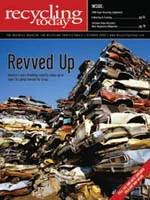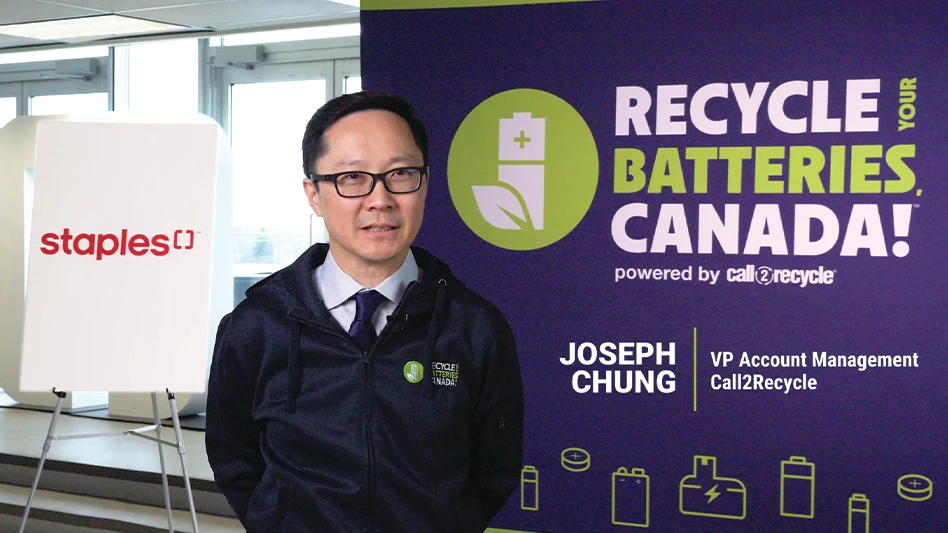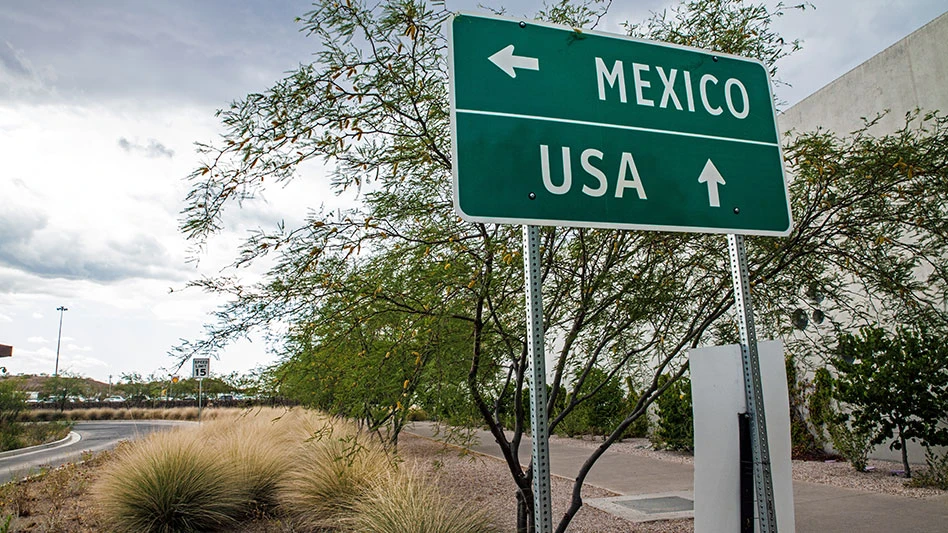There is more to export transactions than filling a container with a secondary commodity and shipping it overseas. Recyclers must comply with the protocols of their trading partners’ home countries.
The recycling industry is truly a global business. China, India, Mexico, Russia and Turkey are among the many destinations for various recyclables from the United States. While this fluid movement of material has resulted in a multi-billion dollar business, challenges are not limited to finding a buyer for the material. Companies are finding they must comply with more requirements when filing out the paperwork required to ship material to a particular country. Overcoming regulatory initiatives, ensuring that the material complies with environmental policies and even making sure the financing for the shipments is in place are all essential to ensuring that both parties are satisfied with the deal.
PROPER CONDUCT
In today’s challenging regulatory environment, increased pressure to comply with environmental regulations in both the shipper’s home country and the buyer’s home country is putting an even greater focus on properly conducting business with companies outside the United States. In addition to these regulatory challenges, recyclers also must ensure the financial arrangement between the buyer and seller is solid.
On the regulatory side, China has attempted to crack down on sham recyclers by requiring AQSIQ (General Administration of Quality Supervision, Inspection and Quarantine) licenses for any company that is going to ship scrap material into the country. Through the much-publicized AQSIQ licenses, which have been required since July of 2004, shippers of recyclables must be approved to conduct business with China. The AQSIQ licenses are not given in perpetuity, but are generally valid for a period of three years. In September, 2,169 registered suppliers received renewals, according to the China Compulsory Certification Online Service Center, bringing the total number of companies receiving license renewals to slightly less than 8,000 so far this year.
For a host of reasons, AQSIQ has cancelled nearly 800 other licenses, often because of a difference between the stated quality of the material being shipped and the actual contents of the container upon its arrival in the country.
While being AQSIQ licensed is a big step for a recycler, it is only the first of a number of additional steps that need to be taken to ship material to China. Even after receiving a license to ship recyclables to China, all loads need to be pre-inspected by CCIC (China Certification & Inspection Co.). The CCIC operates 36 branches in mainland China. It also has 18 overseas branches and representative offices in Asia, Oceania, Europe, North America and South America. After a shipment is inspected and approved, a certificate is included with the shipment. According to Scott Horne, vice president of government relations with the Institute of Scrap Recycling Industries Inc. (ISRI), Washington, some of these certificates are now being sent digitally.
While not without challenges of their own, most other countries haven’t joined China in requiring licenses in order to ship recyclables to consumers within their borders. India, for example, another growing player in the export market for U.S. recyclers, had contemplated requiring pre-shipment inspections; however, after consultations with representatives from the U.S. scrap industry, the Indian government instead opted to avoid this path.
Traditionally, exporters and importers, for the most part, have been able to develop an effective way to work through many of the uncertainties involved in shipping recyclables. However, the growth in the export of electronic scrap has added a new wrinkle to the procedures. Investigations have yielded concerns over "unregulated" shipments of electronic scrap. Some opponents have called for the outright ban or severe restrictions on shipments.
POINTS OF CONTENTION
A recent report by the United States Government Accountability Office (GAO) states that a portion of the electronic scrap being shipped from the United States to developing countries is essentially hazardous waste. The report, released at the end of September, finds that items such as cathode ray tubes (CRTs) have been moving to developing countries without the proper notification of the U.S. Environmental Protection Agency (EPA). Under the EPA’s CRT Rule, which went into effect in mid-2006, U.S. companies must notify the EPA before exporting CRTs. In this context, GAO examined the fate of exported used electronics, the effectiveness of regulatory controls over the export of these devices and options available to strengthen federal regulation of exported used electronics.
The report notes that while some exporters of the material conducted business responsibly, a significant number didn’t. U.S. hazardous waste regulations have not deterred exports of potentially hazardous used electronics, the report concludes. While U.S. agencies have targeted CRTs, the GAO report finds that many other forms of electronic scrap do not undergo the same scrutiny. A key reason: many of the relevant U.S. regulations address only how the products are disposed of in the United States.
In fact, the GAO reports that even with the policies in place regarding CRTs, there have been cases where inspections officials or the companies receiving shipments have uncovered illegally exported CRTs. This has highlighted the fact that regulatory restrictions have not halted these shipments. EPA officials have acknowledged compliance problems with its CRT Rule, but have said that given the rule’s relative newness, their focus was on educating the regulated community. This reasoning appears misplaced, however, given GAO’s observation of exporters willing to engage in apparent violations of the CRT Rule, including some who are aware of the rule. Finally, EPA has done little to ascertain the extent of noncompliance, and EPA officials have said they had neither plans nor a timetable to develop an enforcement program.
FINANCIAL MATTERS
Regulatory issues may challenge exporters, but financial concerns associated with export sales cannot be overlooked.
Before a company decides to ship material overseas, it is important to ensure that the financial institutions being used have the capability to handle the transactions.
Secondly, while growing a relationship with a bank is a good step to developing an export program, it also is imperative to be aware of the different options available when buying or selling material offshore.
One of the common ways in which parties establish payments is through a letter of credit. Through this method, a seller has a greater assurance that payment for the material will be made than through any statements on the part of the consumer alone.
Sponsored Content
Labor that Works
With 25 years of experience, Leadpoint delivers cost-effective workforce solutions tailored to your needs. We handle the recruiting, hiring, training, and onboarding to deliver stable, productive, and safety-focused teams. Our commitment to safety and quality ensures peace of mind with a reliable workforce that helps you achieve your goals.
Although not as safe as cash up front, the ability to have an overseas bank provide confirmation that payment will be made is the method preferred by many recyclers. This method is typically used with shipments outside North America, though that isn’t always the case.
Letters of credit accomplish their purpose by substituting the credit of the bank for that of the customer for the purpose of facilitating trade. There are basically two types: commercial and standby.
The commercial letter of credit is the primary payment mechanism for a transaction, whereas the standby letter of credit is a secondary payment mechanism.
Although not as secure, another method of payment is through a documentation of collection. While documentation of collection does not provide as much safety as a letter of credit or cash up front, there is some security for the buyer.
One large West Coast exporter notes that it is very important to know who you are dealing with in terms of export transactions because of the number of potential issues. "You better be dealing with reputable customers," he notes. "You also have to have a reputation with the receiving bank."
The author is senior and Internet editor of Recycling Today and can be contacted at dsandoval@gie.net.
Get curated news on YOUR industry.
Enter your email to receive our newsletters.

Explore the October 2008 Issue
Check out more from this issue and find your next story to read.
Latest from Recycling Today
- Recycled steel price crosses $500 per ton threshold
- Smithers report looks at PCR plastic’s near-term prospects
- Plastics association quantifies US-EU trade dispute impacts
- Nucor expects slimmer profits in early 2025
- CP Group announces new senior vice president
- APR publishes Design Guide in French
- AmSty recorded first sales of PolyRenew Styrene in 2024
- PRE says EU’s plastic recycling industry at a breaking point







